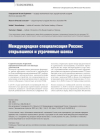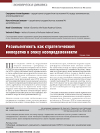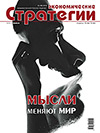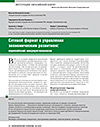Russia’s International Specialization: Opening and Missed Chances
DOI: https://doi.org/10.33917/es-6.186.2022.86-91
We describe the “window of opport unity” objectively opened up after the coronacrisis for Russia’s entering advanced service niches in global industrial chains and improving its international specialization. We show that after falling under Western sanctions in Spring 2022, Russia has lost this opportunity and suffers a technological rollback due to isolation from global markets.
References:
1. Export by Product Group. 2020. WITS, available at: https://wits.worldbank.org/
2. Smorodinskaya N.V., Katukov D.D., Malygin V.E. Global’nye stoimostnye tsepochki v epokhu neopredelennosti: preimushchestva, uyazvimosti, sposoby ukrepleniya rezil’entnosti [Global Value Chains in the Age of Uncertainty: Advantages, Vulnerabilities, Ways for Enhancing Resilience]. Baltiiskii region, 2021, no 3, pp. 78–107.
3. Ivanov D. Viable supply chain model: Integrating agility, resilience and sustainability perspectives-lessons from and thinking beyond the COVID-19 pandemic. Annals of operations research, 2020. P. 1–21.
4. World Bank. World development report 2020: Trading for development in the age of global value chains. Washington, DC, World Bank, 2020.
5. World Bank. Russia integrates: Deepening the country’s integration in the global economy. Washington, DC, World Bank, 2020.
6. Abdrakhmanova G.I., et al. Sektor IKT v 2021 godu: na pike rosta v preddverii novykh uslovii [ICT Sector in 2021: the Pinnacle of Growth on the Threshold of New Conditions]. Tsifrovaya ekonomika, 2022, no 56(240), available at: https://issek.hse.ru/news/655861546.html.
7. Smorodinskaya N.V., Katukov D.D. Shansy vykhoda Rossii na rynki Industrii 4.0 cherez uluchshenie svoikh pozitsii v raspredelennom proizvodstve [Russia’s Opportunities for Entering Industry 4.0 Markets by Improving Its Position in Distributed Production]. Zhurnal Novoi ekonomicheskoi assotsiatsii, 2022, no 1(53), pp. 223–231.
8. Panel’ monitoringa sanktsii protiv Rossii [Russia Sanctions Dashboard]. Castellum.AI, available at: https://www.castellum.ai/russia-sanctionsdashboard
9. Bank Rossii. Makroekonomika i rynki [Bank of Russia. Macroeconomics and Markets]. O chem govoryat trendy, 2022, no 2, available at: https://cbr.ru/Collection/Collection/File/40953/bulletin_22-02.pdf.
10. Simola H. Trade sanctions and Russian production. BOFIT. Policy Briefs, 2022, no 4.
11. Chorzempa M. Export controls against Russia are working — with the help of China. The Peterson Institute for International Economics, 2022, available at: https://www.piie.com/blogs/realtime-economic-issues-watch/export-controls-against-russia-are-working-help-china.
12. Bank Rossii. Osnovnye napravleniya edinoi gosudarstvennoi denezhno-kreditnoi politiki na 2023 god i period 2024 i 2025 godov [Bank of Russia. The Main Directions of the State Monetary Policy for 2023 and the Period of 2024 and 2025]. Moscow, Bank Rossii, 2022.
13. Chebakova D., Balashova A. Uchastniki rynka otsenili novuyu volnu uezzhayushchikh iz Rossii aitishnikov [Market Participants have Assessed a New Wave of IT Specialists Leaving Russia]. RBK, 2022, 28 sentyabrya, available at: https://www.rbc.ru/technology_and_media/28/09/2022/633324f39a7947518c6fd452.







